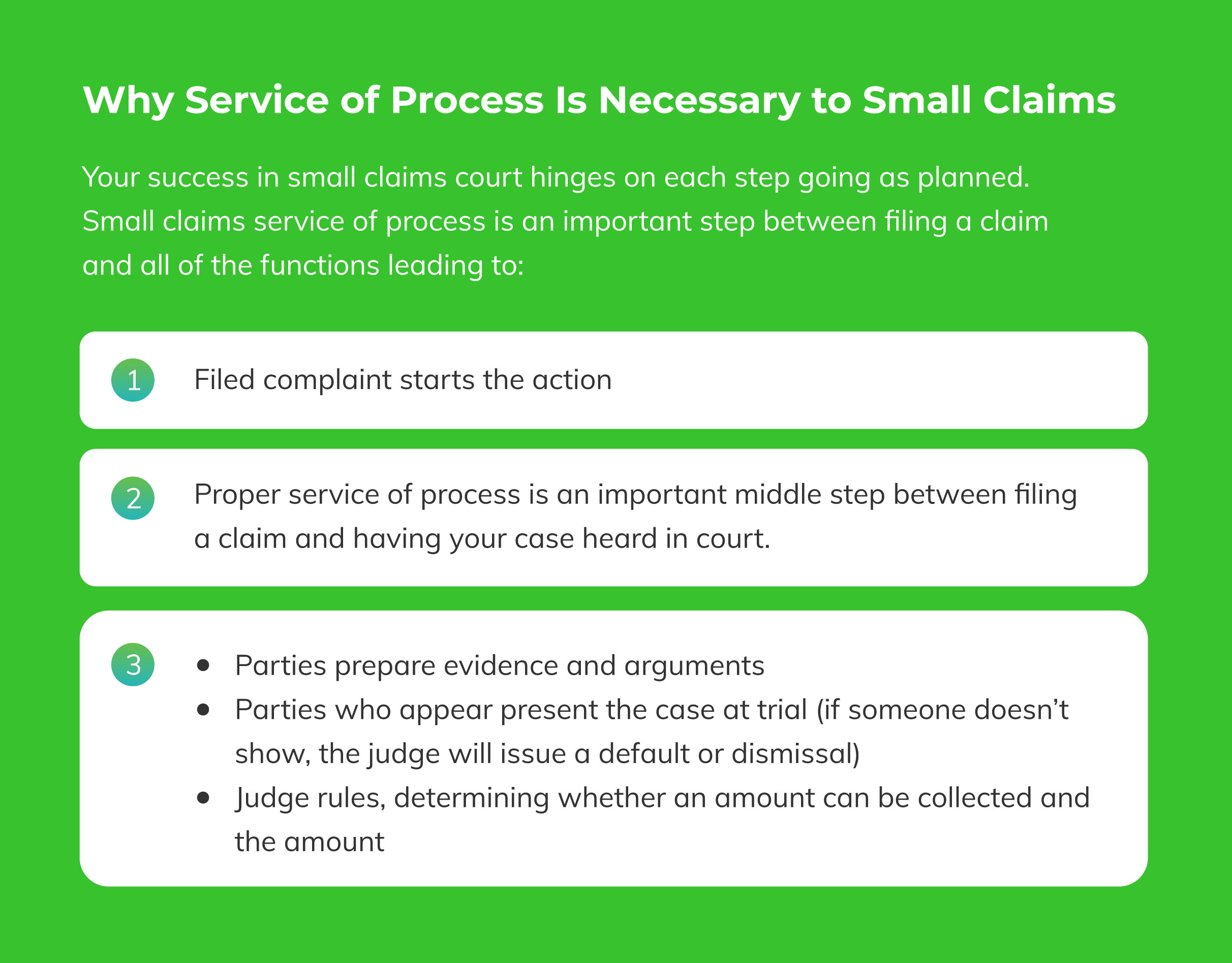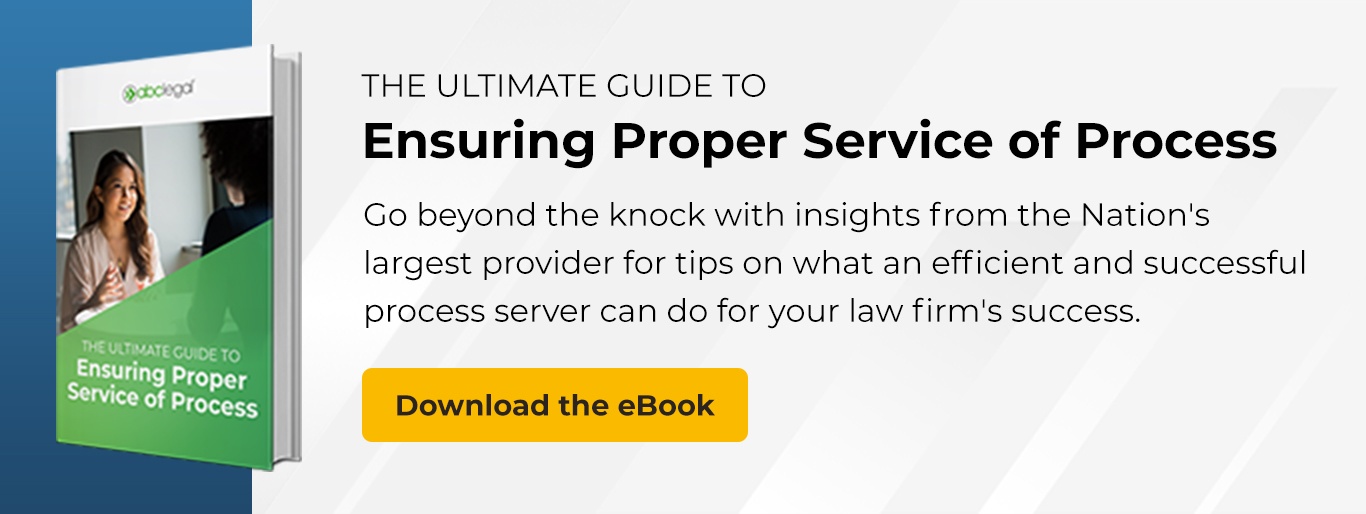If you're a small business or individual looking to resolve an outstanding debt owed to you, you may be interested in small claims court. These courts are less formal than traditional courts and don't require you to hire a lawyer to represent you.
As a result, small claims courts are more accessible to businesses or people looking to resolve "smaller" claims—while the amount varies, these courts typically deal with cases ranging from $2,500-$25,000.
It's important to note that, as part of your small claims court case, you may work with someone called a "process server" to physically serve paperwork to the person you're filing against in accordance with local regulations. ABC Legal specializes in service of process and is a reliable option when you need this type of provider.
Read on to learn what small claims court is, when you might want to use it, why you need a dependable process server, and more fundamentals when answering how does small claims court work.
What Is Small Claims Court?
Small claims court is used to resolve monetary disputes ranging from a few thousand dollars to $25,000. While many people don't think of $25,000 as a "small" claim, these cases involve much less money than the ones that find their way into traditional courtrooms.
Anyone can use small claims court to settle their civil dispute. However, small claims court is unique in that the resolution can only involve money. That means that you would not be able to go to small claims court to try to force someone to return a piece of property, but you could file a case to be repaid for an outstanding loan.
The most common question we hear about small claims cases is, "Do I need a lawyer for small claims court?" The answer is no. In fact, some small claims courts don't allow attorneys at all and require the parties involved to represent themselves. This is referred to as "pro se," which translates to, "in proper person."
Examples of When Small Claims Court May Be Appropriate
Because small claims court judgments can only result in money payments, you may want to consider initiating a case when you are looking to be reimbursed or repaid for a good or service.
Here are some examples of situations in which small claims court may be an appropriate avenue:
- A small business, such as an auto repair or construction company, is looking to collect money owed from someone they provided services for
- A tenant wants to collect their security deposit from a landlord
- Conversely, a landlord wants to be repaid for damages to the apartment in excess of the security deposit
- A company paid for a good or service that was never delivered and is seeking a refund
- Someone is injured by another person's pet and wants to be paid
- A person desires a way to enforce repayment of an outstanding loan
These are just a handful of scenarios, of course; there are myriad instances in which you may be able to recoup your money by going to small claims court.
How to File in Small Claims Court
Every state has different procedures for small claims court cases, but there is a general, overarching process most of them follow. Generally, the small claims process consists of three steps.
-
First, you file a petition or a complaint, which is a form stating why you want to initiate this small claims court case. This generates a citation, which is what the defendant will be served with.
-
Then, you must have the defendant(s) (the person or people you are suing) properly served so they have notice of the case. This is done by a process server; you are not allowed to serve the paperwork yourself. It is essential to hire a process server that complies with all applicable regulations to be sure your service stands up in court and doesn't hold up your case. Rules around how the paperwork is served vary by location, so it is important to work with an experienced process server. (See details below.)
-
Your case will be heard. Some courts might also require you to meet with a mediator before you go to court. If you attend your scheduled court date and the defendant in your case doesn't show up, you can still try to prove your case and win by "default judgment". If they do appear in court, they'll be able to give their side in court and the judge will decide.
Remember that this is just a general overview. You'll want to research your state's laws to ensure you're complying with them!
Why Does Small Claims Process Server Choice Matter?
One of the most critical components of filing your small claims court case is working with a process server you can trust. All of the parties you are suing must be served with proper notice in order for your case to proceed smoothly.
Small claims service of process requires individuals to be served separately. How the small claims process server delivers your documents will depend on local rules and regulations. There are state limitations as to who is allowed to serve documents and how. The right small claims process server can solve all those issues. On occasion, additional investigation is needed to locate the person or proper representative of a business to be served. Having access to these investigatory services can be helpful.
When you're vetting small claims process servers, be sure to look for a company that is:
- Dependable and trustworthy with proven results
- Established in the industry
- Experienced in your geographical area
- Transparent and communicative, providing updates every step of the way
Communication from process servers can vary. As an example, small claims process servers with ABC Legal provide updates of serves every step of the way, providing real-time texts noting progress.
Once the individual has been served, the small claims process server will provide a proof of return. This proof of return can then be filed with the court attesting to proof of service. It is important for small claims process servers to follow all small claims service rules and guidelines while delivering documents, because the case could be delayed or even dismissed if procedures have not been followed properly.
Key Considerations Before Entering the Small Claims Process
Even though small claims court is less formal than traditional courtrooms, it still requires your time, energy, and possibly money. Therefore, there are a few questions you want to ask yourself before you file your petition or complaint.
These include:
- Is the amount in question less than the maximum that my state's small claims courts allow?
- Do I have my documentation in order?
- Am I prepared to wait until my case is resolved to receive the money? Am I also ready to follow up on the judgment if I don't receive my payment even after the case?
- Am I within the time limits to file in small claims court? Most states have a statute of limitations so if you're looking to collect payment from years ago, you may not be able to go to court.
Working through these questions can help you make the right decision for you when it comes to whether to pursue a small claims court case.
How Does Small Claims Court Work for Collections Matters?
If you're a small business owner looking to collect on a payment owed to you and your customer has been unresponsive, small claims court is a viable option. Alternatively, you could outsource the collections to a third-party agency and pay them a percentage of what you recover.
Remember that the payment in question must be less than the maximum amount you can bring to a small claims court case in your state. State variation is considerable: In Kentucky, for example, the cap is $2,500, whereas in Georgia it is $15,000 and in Tennessee it is $25,000.
If you decide you do want to proceed with small claims court, be sure that you have good documentation of the service or goods you provided and your attempts to collect the money that is owed to you. This will help the judge understand your case. Also, be prepared for the potential that you or one of your staff members will have to appear in court to present your case to the judge.
How Does Small Claims Court Work for Services Not Delivered?
Sometimes a business or individual may file suit if they have paid for work to be done, but the work was done poorly and the contractor has refused to fix it. In these instances, it is important to document payment for the service and any evidence regarding insufficient or ineffective repairs. Keep in mind that small claims judges can order a judgment only for money. So, the judge cannot require the contractor to perform additional repairs.
How Does Small Claims Court Work for Issues of Personal Injury?
Sometimes compensation for medical treatment stemming from small injuries, such as a minor dog bite, may be pursued in small claims court. However, personal injury cases generally aren’t as much of a fit as other types of cases.
It is important to know local rules, because many states require that personal injury cases be filed in formal court and do not allow them in small claims court. In other states, a small claims judge can award an injured party only the dollar amount of the person's out-of-pocket losses (such as medical bills, lost time from work), but doesn't have the power to award an additional amount to cover the individual’s pain and suffering, no matter how legitimate. Damages associated with serious injuries will often exceed the monetary award limits of small case courts.
What Cases Aren’t Allowed in Small Claims Court?
Small claims court is designed for recovering a monetary settlement. Cases unsuitable for small claims court would be divorces, guardianships, or any other family law issues. Name change, bankruptcy and injunctions also are not available in small claims court.
The individual or business being sued also matters. You can’t file a lawsuit against the federal government, any of its agencies, or a federal employee (for an action related to their job) in small claims court.
ABC Legal for Small Claims Process Servers You Can Trust
ABC Legal specializes in ensuring proper service of process. We make the entire process quick, easy, and painless to help expedite the handling of your case. Whether you are an individual or a business seeking financial remedy with small claims court, our process servers can meet your needs. ABC Legal has local process servers in all 50 states and allows you to track the progress of your serves from start to finish.

Written by
ABC Legal Team






